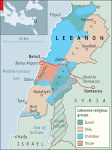Suleiman's (pronounced s[a]lay-MAWN and sometimes transliterated as Sleiman) role, until yesterday, as chief of the Lebanese Armed Forces, made him an attractive candidate to nearly every MP. The army is the most respected institution in Lebanon, mostly because it is fiercely non-sectarian and generally free from corruption. Many people, including all the major political parties, also hailed the army's response to the presence of al Qaeda-inspired foreign militants in the Nahr al Bared Palestinian refugee camp last summer (though many others, particularly Palestinians whose homes were destroyed by the army, continue to criticize Suleiman's violent approach to the conflict; see this, as well as this). Suleiman, nonetheless, begins his presidency under general perceptions of neutrality and patriotism.
It will be interesting to see how long those perceptions hold. In his inaugural speech, Suleiman hinted that he was more likely to lean toward the March 14th governing coalition than to the March 8th opposition. Two passages illustrate this likely stance. First, Suleiman noted,
We still confirm our commitment to and respect for all UN resolutions … especially for the martyr Rafik Hariri and all our martyrs (Now Lebanon).This statement elicited the loudest applause of any during his roughly twenty-minute address. The BBC telecast, however, noted that some MPs did not applaud. The investigation into former Prime Minister Hariri's death has been a quietly contentious matter ever since he was assassinated on February 14, 2005. There are many politicians and commentators who believe that the opposition is trying to prevent the Lebanese government from cooperating with UN investigators. The Syrian government, which enjoys a now muted alliance with the opposition, is at the heart of the investigation.
Second, according to Now Lebanon's transcription of the address, Suleiman uttered these statements, clearly in reference to Hezbollah's use of force just over two weeks ago:
Any gun is only pointed at the enemy, and we will not allow it to be aimed elsewhere...The continuation of the resistance depends on the people’s need for [the resistance], and its achievements should not be used by internal struggles.Grumblings about Hezbollah's about-face on its longtime pledge to never use its weapons on another Lebanese can still be heard just beneath the surface of the pomp, circumstance, and "back-to-normality" of the past five days. So this statement, on the one hand, could be interpreted as an appeasement to those factions. On the other hand, it could signal Suleiman's intentions to reign in the power of Hezbollah, something with which America and Israel, as well as many people aligned with March 14th, would be thrilled. The United States' continued assistance to the Lebanese Armed Forces (though a pittance compared to US aid given to Lebanon's only major enemy) could play a role in Suleiman's approach to the opposition.
In contrast to these statements, however, Suleiman also said that he favored "brotherly ties" with Syria, which, if nothing else, is a bone for the pro-Syrian opposition to chew on.
We'll see how long the honeymoon lasts.

No comments:
Post a Comment